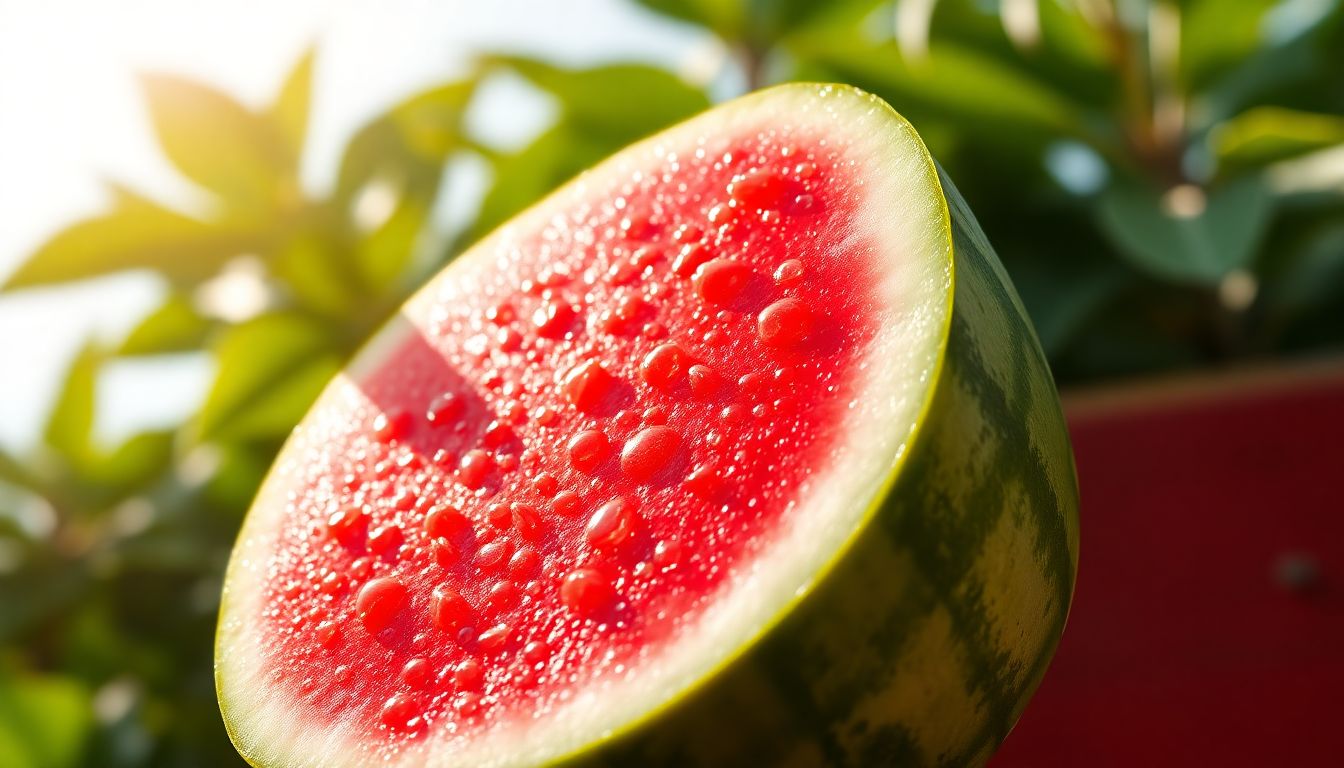Refresh Your Body: Top Health Benefits of Eating Watermelon

Watermelon is one of the most loved fruits, especially during hot summer days. Its juicy sweetness and vibrant color make it a favorite, but there’s more to it than meets the eye. This fruit is packed with essential nutrients and brings a host of health benefits. From hydration to heart health, watermelon can be a powerhouse in your diet.
Hydration and Electrolyte Balance
Watermelon’s High Water Content
Watermelon is approximately 92% water, making it one of the most hydrating foods available. The USDA recommends that adults consume about 11 cups of water daily. Including watermelon can help you meet this goal effortlessly.
Electrolyte Replenishment
Watermelon is rich in potassium, an essential electrolyte. After a vigorous workout, consuming watermelon can help replenish lost electrolytes. For example, after a long run on a hot day, enjoying a slice of watermelon can speed up recovery.
Hydration for Athletes
Athletes can benefit significantly from watermelon. Research in the Journal of Agricultural and Food Chemistry suggests that watermelon can reduce muscle soreness and improve hydration. Its natural sugars and electrolytes provide a refreshing way for athletes to stay hydrated during intense activities.
Cardiovascular Health Support
Lycopene and Heart Health
Lycopene, a powerful antioxidant found in watermelon, is linked to a lower risk of heart disease. Watermelon contains about 6.1 milligrams of lycopene per cup, making it an excellent source.
Blood Pressure Regulation
The potassium in watermelon contributes to blood pressure regulation. Studies have shown that increasing potassium intake can help lower high blood pressure, reducing the risk of heart problems.
Reducing Cholesterol
Research indicates that watermelon may help manage cholesterol levels. The fiber and antioxidants may contribute to lowering bad cholesterol, promoting a healthier heart.
Antioxidant and Anti-Inflammatory Properties
Lycopene's Antioxidant Power
Lycopene acts as a powerful antioxidant that fights free radicals—unstable molecules that can cause cell damage. It's essential to reduce oxidative stress to maintain overall health.
Citrulline and Inflammation
Watermelon contains citrulline, an amino acid that helps lower inflammation. Conditions like arthritis may benefit from increased citrulline intake.
Boosting Immune Function
The antioxidants, vitamins A and C, found in watermelon support a healthy immune system. Including watermelon in your diet can help fend off illness, especially during cold and flu season.
Improved Digestion and Gut Health
Fiber Content and Digestive Health
With about 0.4 grams of fiber per cup, watermelon supports digestive regularity. The recommended daily fiber intake for adults is 25 grams, making watermelon a tasty addition to your fiber-rich diet.
Prebiotic Benefits
Watermelon may also act as a prebiotic, promoting a healthy gut microbiome. This can enhance digestion and overall gut health, as supported by several studies.
Watermelon for Digestive Issues
Mild digestive discomfort can be alleviated by the hydrating properties of watermelon. Eating watermelon can soothe the stomach, especially in warmer weather.
Skin Health Benefits
Vitamin C and Collagen Production
Watermelon is high in vitamin C, which plays a vital role in collagen production. Collagen is essential for maintaining skin elasticity and reducing signs of aging.
Hydration and Skin Appearance
The high water content of watermelon helps keep the skin hydrated. A well-hydrated skin looks plump and vibrant, helping to maintain a youthful appearance.
Antioxidant Protection Against Sun Damage
Watermelon’s antioxidants offer some protection against sun damage. They help combat the harmful effects of UV rays, a bonus for sunny days at the beach.
Muscle Recovery and Performance
Citrulline and Improved Blood Flow
Citrulline in watermelon may improve blood flow, benefiting muscle recovery. Studies suggest that athletes can experience reduced soreness and fatigue after consuming watermelon.
Hydration and Muscle Function
Proper hydration is critical for optimal muscle function. The water and nutrients in watermelon work together to ensure muscles function correctly, especially during workouts.
Real-World Examples
Many athletes enjoy watermelon smoothies or snacks after workouts. This not only helps replenish their energy but also aids in faster recovery times.
Conclusion
Watermelon is not just a refreshing treat; it offers numerous health benefits that can enhance your overall wellness. From hydration to heart health, incorporating watermelon into your diet can be simple and enjoyable. Try a watermelon salad or a smoothie to make the most of this healthy fruit. Embrace its benefits and enjoy a slice of health today!
=======================
Comments
Post a Comment